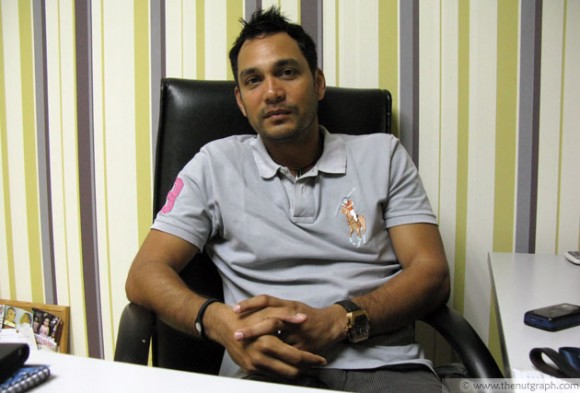
HE’s a first-generation Malaysian with a German Jewish name. But Hans Isaac, whose full name is actually Gerald Hans Isaac, says he is “more Malaysian than a lot of Malaysians”.
Isaac is a well-known actor with numerous film credits and awards and he is today famously known for successfully directing his debut film Cuci (2008), a comedy which he co-wrote with best friend Harith Iskander, and Ted Azelan. After the movie, Isaac acted in and produced Cuci the Musical (2009). It was so popular it was restaged in Kuala Lumpur earlier this year in 2010.
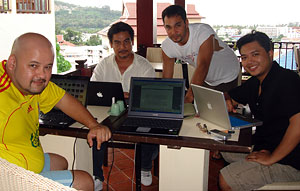
“I’ve taken a word out of the Malay dictionary [that people associate with cleaning] and I’ve changed it into a brand. I want to build brands and not just produce one-off projects,” he tells The Nut Graph on 8 Sept 2010 at his office in Ampang where he’s built up his 10-year-old company, Tall Order Productions. “We’re a small company doing massive projects,” Isaac, who is the company’s managing director, beams, citing Cuci the Musical and the upcoming Lat Budak Kampung Musical.
Isaac is co-producing the Lat Budak Kampung Musical and will be co-directing it with Harith. It is his most ambitious project yet. “That project, I think, is one of the biggest pressures I’ve got. Because it’s about an icon, it’s about [Lat] and we’ve to create a story out of it,” he says of the project for which the prime minister is the patron.
TNG: When were you born?

Hans Isaac: I was born on 20 Aug 1971 in the Sultanah Aminah General Hospital in Johor Baru.
My dad was a naval officer. He was the head of the old navy base, KD Malaya, across the Causeway. And I grew up in a navy base.
So how long were you in JB for?
We were in Johor for about eight years and then we moved to Sibu because my dad was posted at KD Sri Rejang, and then we were shipped to KL to another base.
And so how old were you when you finally came to KL?
I was eight or nine.
So, this was the last move that your family made?
Ya, because my [late] dad was based at the palace here. He was the aide to the king. So, we were in a navy base up in Mindef (Ministry of Defence). And then, after that, he retired and I continued with my life [in Kuala Lumpur].
Which school did you go to here?
St John’s (Institution). A lot of people from the entertainment industry have come from St John’s.
Do you think the school environment somehow had something to do with all of you ending up in the creative industries?
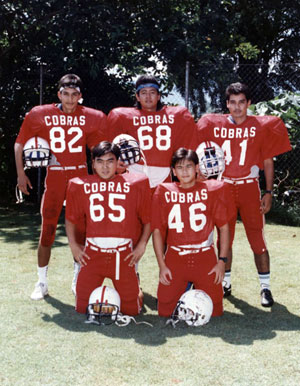
St John’s back then used to be an all-round school. You had drama, the arts, public speaking, sports, religious studies — the Malay guys went for ugama, we went for catechism — everybody had their thing to do. It was never a school that was just about one race.
St John’s was run by the (Christian) brothers but the priority there was that everybody was equal and the same. The school was always run that way. The teachers were mixed — Chinese, Malays, Sikhs, Indians, we had a half-celup teacher.
In the football team, there was a Chinese, an Indian, Malay, Eurasian. Anything you went for, it was always mixed.
So, did the notion of race ever dawn on you at that time?
Never. I had ten buddies in my school. Ten of us who hung out together, everyday. I was the only non-Malay. It was never an issue.
And you never ever felt that you were an outsider, right?

No, never. They never treated me differently. Just like the film industry now and what I’m doing. It’s weird that a non-Malay like me is taken in by the Malaysian public. I can act in feature films, I can do theatre productions and be on stage and people who come and watch it, they would not go, ‘Oh, ini bukan Melayu.’ I think the people who state that are people who are insecure about themselves.
Can you trace your ancestry?
My grandfather on my mother’s side is Filipino. My maternal grandmother is Eurasian.
My late grandfather on my dad’s side is Indian and my grandmother from my dad’s side is Eurasian.
Wow, that’s a nice mix.
There is Portuguese…I think we’ve got ten different sorts of blood in us. Nowadays in Malaysia, you can’t find a single person who is not mixed.
How did your parents meet?
My mother’s family ran the Singapore Symphony Orchestra and they had a big mansion which also served as an orchestra studio rehearsal space for students and professionals in Singapore. My mum’s mother used to throw a lot of parties. My dad was invited to the house and that’s when they met.

Do you have siblings?
[My elder] brother lives in Manila. And I have a younger sister who lives here in KL.
It never occurred to you that you would live in Manila?
No. I never wanted to live in another country. I love Malaysia.
What do you love about Malaysia?
I love the accessibility in Malaysia. I love the fact that I can walk on the street and feel safe. I love the fact that we’re a mixed bunch of people. My best friends — there’s a Mat Salleh, Scot Henserling; a Chinese [Malaysian], Jason Cheah; an English Sikh, Amarjit Chhina; and Harith who’s half white, half Malay. I have a guy called Azlan Shah who is pure Malay (chuckles). And there’s me. Between five guys, you know, none of us are alike.
And we get along really well.
And you don’t think that you’d be able to find that kind of diversity and richness elsewhere?
No.

Do you know what generation Malaysian you are? Your dad was born here?
No, my mum and dad were born in Singapore.
My brother, my sister and I were born in Malaysia. So, I’m first generation Malaysian.
Yes. But your dad was Malaysian, right?
No, Singaporean. He was in the navy when Singapore and Malaya were together. When they split, government officers could decide whether they wanted to go over to Malaysia or stay in Singapore.
The reason my father came to Malaysia was because he was very close to the late Sultan of Johor. They were good friends. He had a huge influence in getting my dad to stay in Malaysia. He would tell my dad, ‘You should come over to this side’ (chuckles).
But the second reason, I think, was also because Singapore has small waters. As a navy officer, my dad wanted to sail, he wanted to command battle ships. He knew that Malaysia had more waters.
What’s the strongest memory that you have of the place that you grew up in?
I would say Johor and Singapore because we lived in Johor but we would go back during the weekends to Singapore. And Johor was the navy base that we lived in. It had a big garden. As a kid I could run around.
My memory was always also about toys and my dad going, ‘Ok, if you’re good and you do this, we’ll go down to the navy market and you’ll get a toy.’ Everything we wanted, we had to earn! We did have a lot of birthday parties then. So, as a kid, it was fun.
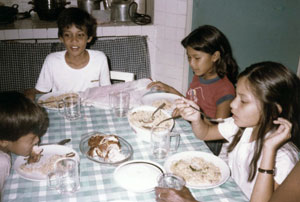
In Sibu, it was about learning and being aware about my surroundings. We were taught to go to the long houses and see the Iban and Dayak. My dad used to always visit them and he would bring us.
And that time, there were a lot of communists so everywhere I went, I sometimes had a bodyguard next to me with a gun. My dad was chief of the navy, so they were afraid that the communists would try to get to the kids to get to my dad. So the whole family, everywhere we went, we had bodyguards.
And because we lived on the navy base, everybody knew who my brother and I were. If we got into trouble, my dad would know (laughs). If we did any wrong, when we went back, it was either the cane or the belt.
What stories from your childhood do you remember?
Every birthday, we used to get a present…we had a house, we had enough to live. Then, the family went through a tough time. Financially, and everything else that came with it. And I remember my dad, who used to always buy me stuff, like a bicycle, one birthday, he pulled out a RM2 bill and said, ‘This is all I got for you.’
I was in Standard 6 or Form 1.
And what was your reaction to that?
I was shocked at first. From that day, I said, I would work very hard to give my family whatever they need and not have to go through a time like that ever again.
People say, ‘You’re a workaholic.’ I say, ‘Yes.’ I enjoy working and I want to take care of my family. I want all the people around me to be looked after and if I can help them, then I’m happy.
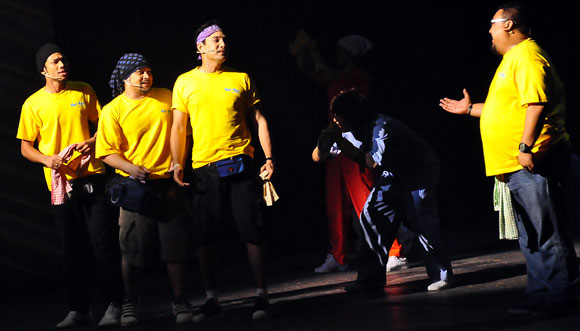
Are there any aspects of your identity that you struggle the most with as a Malaysian?
There are times (pauses) in the business world when you are put aside. Meaning, you’re not taken into account because your name is ‘Hans Isaac’. My name doesn’t sound Malaysian.
It doesn’t?
It’s German Jew. Hans, it’s so German!
But how did that happen?
My maternal grandfather, he wanted us to have German names. So my brother is named ‘Carl’ — a German name. [And mine is] ‘Hans’ — a German name.
And Isaac was the family name. People think it’s a stage name.
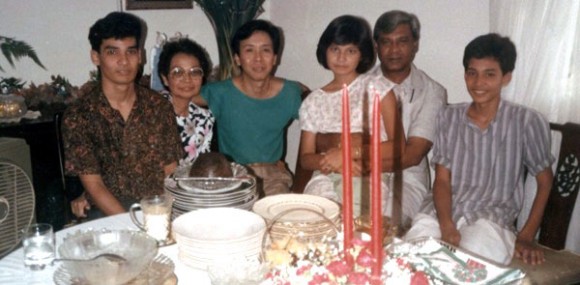
But your first name is Gerald, isn’t it?
Ya, it was because my dad had a mix-up in the birth registration. My dad is also a Gerald. So my mum said, register ‘Hans Gerald Isaac’.
My dad is Gerald Edward Anthony Isaac. So, when he went to register my birth, he was quite nasty (laughs) and registered me as ‘Gerald Hans Isaac’ and then said they made a mistake (laughs). But he knew! He did it purposely.
And my mother said, no matter what, I’m calling him Hans. So, still my dad didn’t get his way (chuckles).
But you were saying you sometimes get sidelined because of your name? Does that still happen today?
Sometimes, not a lot.
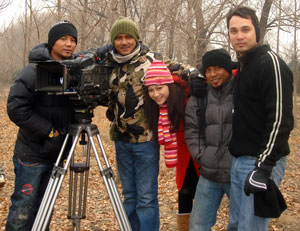
And this is in show biz?
Ya. I’ve heard one or two lines when they don’t realise I’m around. You must remember, my industry, the modern filmmakers, the guys that I hang out with, don’t care about this anymore. And you have the old-school people who still think that way.
I have respect for them because they’re my seniors. But some of them still have that thinking: ‘Oh, ini bukan orang kita.’
But you would say that you’re as Malaysian as the next Malaysian, right?
I’m more Malaysian than a lot of Malaysians (laughs).
I love leaving the country for holiday or work but I can’t wait to come home to Malaysia. ![]()
The book Found in Malaysia, featuring 50 of our best interviews plus four previously unpublished ones with Datuk Zaid Ibrahim, Tan Sri Rafidah Aziz, Datin Paduka Marina Mahathir and Ramli Ibrahim, is now available at all good bookstores for RM45.


m.k. says
This article once again demonstrates that we had 1Malaysia long ago, especially in Christian schools. Having studied at St John’s Institution (SJI), the La Salle Brothers and teachers have given him an all-round education, which is the hallmark of a Lasallian education.
Incidentally, our PM who coined 1Malaysia is also an old boy of SJI.
mike says
This article is a farce. A professional from the entertainment industry is using politics as a platform to say he is better and truer that other Malaysians. “I love Malaysia more than you!”” No, that’s not true. I love Malaysia MORE MORE, so I am more Malaysian.” Wow! How enlightening!
I really don’t think Malaysians are so stupid as to fall for such interviews and go, “Yeah, maybe I need to love Malaysia MORE, MORE, MORE!!!” [Trying to get the better of one another] is getting absurd in Malaysia’s entertainment industry.
The Nut Graph can, and should, do substantial pieces with real-world insights. Respect the intelligence of your audience, and it will be reciprocated. Do dumb pieces like this, and you will get dumb readers.
Farouq Omaro says
I think I know how Hans feels about being Malaysian first.
Shamaine says
Yes, he is accepted in the local entertainment industry, but most of the time it’s because he plays a Malay character, not a Eurasian character. That’s why he hasn’t been treated differently.